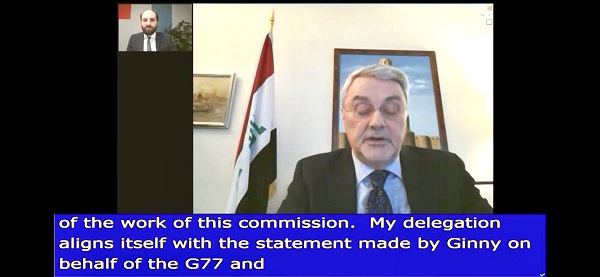Iraq’s statement during the fifty-ninth session of the Commission for Social Development in the meeting entitled “The role of digital technologies in social development and community well-being.”

The Permanent Representative of the Republic of Iraq to the United Nations, His Excellency Ambassador Mohammad Hussein Bahr Al-Uloom, delivered the speech of the Republic of Iraq during the fifty-ninth session of the high-level week of the work of Social Development Committee, in which he stressed the exacerbation of the existing challenges regarding social development, as a result of the outbreak of the Covid-19 pandemic, which left a negative impact on the ability of governments to achieve the goals of the 2030 Agenda for Sustainable Development.
His Excellency, the Permanent Representative, emphasized that, when the pandemic broke out, schools were closed in an attempt to protect children and youth from the pandemic. Nevertheless, the government sought the continuity of education, in cooperation with specialized United Nations agencies, especially the United Nations Children’s Fund (UNICEF), to provide digital education platforms, while developing alternative educational curricula, including through television and internet platforms.
The Permanent Representative, Bahr Al-Uloom, indicated that the Ministry of Communications began in mid-September to increase the equipped international and domestic Internet capacities, with the same previous prices for the Internet without an increase, in order to improve the Internet service in light of the Covid-19 pandemic. He also mentioned that the Ministry of Labor and Social Affairs had implemented digital services to assist the elderly in completing their transactions by activating electronic work to complete retirees’ transactions as quickly as possible in a manner that ensures their safety and provides a safe working environment for workers in various sectors.
In conclusion, His Excellency stressed the urgent need to address inequalities and disparities within and between countries by strengthening international cooperation in the field of supporting state capacity building, exchanging information and experiences in the field of information technology, communication in particular in the field of providing public services and providing technical and economic assistance, especially those that target Persons with disabilities by facilitating their access to digital technologies.